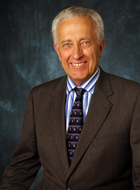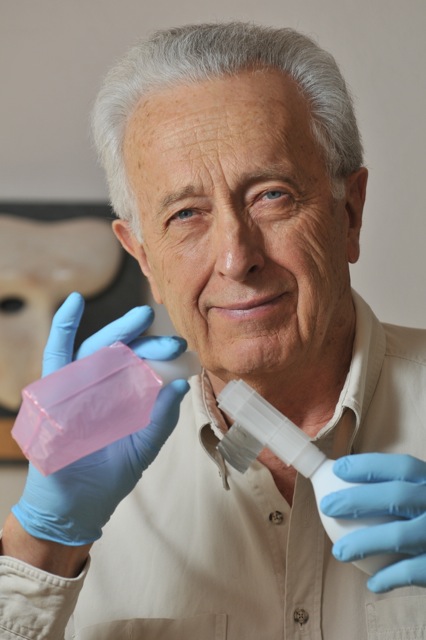Robert E. Sievers

Analytical, Pharmaceutical and
Environmental Chemistry
Ph.D. University of Illinois, 1960
Director, Environmental Program
Professor, Chemistry and Biochemistry
E-mail: sievers@cires.colorado.edu
Office: Ekeley W281B
Phone: 303-492-7943
Web: Global Health Research Group (CIRES) | Environmental Program (University of Colorado at Boulder)
Research Interests
Professor Sievers is studying analytical chemistry, pharmaceutical science, aerosols, microparticles and nanoparticles, inhalable vaccines and antibiotics, and supercritical fluids.
Fundamental and applied studies of the formation of nanoparticle and microparticle aerosols are underway. Carbon dioxide-assisted nebulization provides superior aerosols for various forms of spectroscopy, such as electro-spray ionization, mass spectrometry and atomic absorption. Sievers' students are collaborating with pharmacists and physicians in the University of Colorado Health Sciences Center of Pharmaceutical Biotechnology, to develop new methods for delivery of aerosol particles useful in direct and painless administration of therapeutic drugs and vaccines by inhalation. The drugs are dissolved or suspended in supercritical fluids, and unusually small aerosol particles are formed by rapid decompression to facilitate delivery of the aerosol particles to the most distal alveoli and to allow rapid uptake by the lungs. Formation of fine aerosols is expected to become increasingly important in the treatment or vaccination against measles, HPV, influenza, infections, cystic fibrosis, and asthma.
The simultaneous stabilization, drying, and micronization of vaccines, antibodies, proteins, antibiotics, and anti-inflammatory pharmaceuticals and other products of the biotechnology revolution are under study. Two of the fourteen "Grand Challenges identified by the Bill and Melinda Gates Foundation and the NIH Foundation as critical to world health are being addressed by the Sievers group: needle-free administration of vaccines (by pulmonary or nasal aerosols), and vaccines that do not need refrigeration for long term storage. Collaborations with groups in India and South Africa have been developed.
Current Research: Development of needle-free and water-free inhalable dry powder aerosol vaccines

Robert Sievers demonstrates easy vaccination by inhalation of dry powder aerosol vaccines in a needle-free inhaler that he co-invented. Photo credit: Glen Asakawa/CU-Boulder
Inhalable dry powder aerosol vaccines require no needle, no purified water for reconstitution, and no electricity or batteries for delivery, which makes them especially useful in developing countries. Working in Prof. Sievers’ Global Health Group in CIRES, in collaboration with Aktiv-Dry LLC, in Boulder, Colorado, the Serum Institute of India, Ltd., Johns Hopkins Bloomberg School of Public Health, and the U.S. Centers for Disease Control and Prevention, our team developed the first dry powder aerosol vaccine to complete Phase I trials without any adverse events.
To facilitate aerosol delivery, our CIRES team earlier invented the PuffHaler®, an “active” dry powder inhaler with only one moving part, a simple squeeze bulb with its pressure release valve. We also invented a special form of spray drying, Carbon Dioxide Assisted Nebulization with a Bubble Dryer (CAN-BD), that produces aerosol microparticles small enough (1-5 microns aerodynamic diameter) to be distributed throughout the moist respiratory tracts of humans and test animals in which immune responses are generated.
This dry powder aerosol vaccine has been administered to 40 human volunteers without any serious adverse events observed while following the patients 180 days after this Phase I safety clinical trial began in India. This development over the past nine years by a team of 35 chemists, engineers, physicians, immunologists, public health specialists, students, and post-doctorals has been made possible by a $20 million grant (FNIH Grant 1077) from the Foundation for the National Institutes of Health as part of the Grand Challenges in Global Health Initiative created by the Bill and Melinda Gates Foundation.
Publications
Click here for a complete list of published works »
Honors and Awards
- Tswett Chromatography Medallist, 1981
- American Chemical Society Colorado Section Award, 1985
- Dimick Award in Chromatography, 1992
- Thomas Jefferson Award, 2001
- Robert Stearns Award, 2003
- Pinnacle of Inventorship Award, 2004
- ACS Astellas Prize in Public Health, 2008
- Governor's Award for Research Impact, 2009
Dr. Sievers is a professor at the University of Colorado Boulder.

